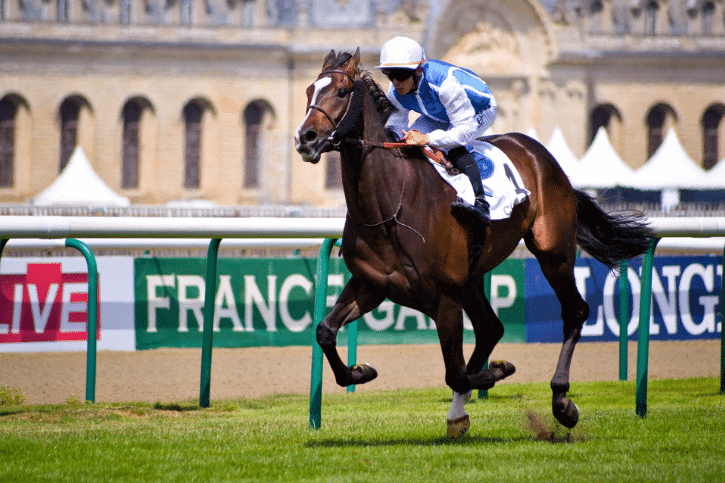What Is A Tongue Tie In Horse Racing?
Horse racing involves a lot of equipment and gear.
Most of it, you can make a pretty good guess what it does and what it’s for.
Some it is a bit harder to make sense of, though, and while I was out at the races with my son the other day, he overheard someone talking about their ‘tongue tie’ for their horse.
Right away he was confused and asked me what it was, and I did my best to explain but fell short of a brilliant explanation.
So, later on, I decided to look into it and do some more research.
So, what is a tongue tie in horse racing?
A tongue tie is a piece of equipment that the trainers and jockeys use to stop the horse getting their tongue over the bit. In order to effectively control a horse, you need to be able to control its mouth. The tongue tie makes sure that the bit stays in place, and the horse doesn’t undo it with its tongue.
So, in horse racing, when we say a ‘tongue tie’ we’re referring to something much more literal than your ordinary kind of tongue tie.
It literally ties the horse’s tongue down and prevents it from getting it stuck over the top of the bit, which would make the horse much more difficult to control.
So, let’s look into it in a bit more detail.
Why do racehorses have their tongues tied?
All of a horse’s equipment is called its tack.
This includes everything from saddles, stirrups and halters, but the tongue tie is part of the bits around the horse’s face.
Before you can understand what the tongue tie does, you’ll need to know about the bit.
The bit is usually a small, metal rod, passing through the horse’s mouth and attached to metal rings at either end.
It’s one of several parts of the tack around the horse’s head that gives the rider control of the horse’s head.
Controlling the head is essential to effectively control the direction of the horse, and indeed to getting it to understand your commands.
The bit is one of the most important parts.
So, imagine if the horse managed to get its tongue out from under the bit.
The rider’s control would immediately be way off balance, as the bit would be moving around uncomfortably and wouldn’t be fitted properly when the jockey tried to move it.
So, this is why horses have their tongues tied.
An additional piece of tack is added which ties the horse’s tongue down to the bottom of its jaw, preventing it from moving around.
Now, if that sounds like it could be potentially painful, you wouldn’t be alone in thinking that.
There has been much debate over the years about the issue of tongue ties.
Do tongue ties hurt horses?
The idea of tying a horse’s tongue down to the bottom of its mouth doesn’t sit right with many people, for a lot of obvious reasons.
So, let’s look into the debate about whether tongue ties are painful for the horse, or if they could be cruel.
The simple fact is that horse racing typically doesn’t not require any veterinary input or diagnoses before allowing trainers to use a tongue tie.
Thus, if proper care is not taken, then the horse may be in considerable distress with no one to correct the problem.
According to some racing authorities, the use of a tongue tie also prevents choking in horses since it helps the airways stay open.
Research has shown no direct link between tongue ties and stopping choking.
Many animal rights authorities do see an issue with tongue ties insofar as they cause unnecessary stress and discomfort, not to mention all the discomfort of the manifold other tack the horse is wearing.
Many horses have to wear these tongue ties for 30-40 minutes during racing and training, which causes obvious signs of anxiety and stress in the animals.
Studies have also shown that horses do not habituate to the discomfort of tongue ties, but simply remain in distress until they are removed.
They are fitted by firmly grabbing the horse’s tongue and twisting the band around it in a figure of 8.
So, just try to imagine if you think that would hurt!
Are tongue ties allowed in events?
Tongue ties were used in most races and racing industries across the world until quite recently.
Germany, for example, has recently banned their use in all racing.
In many colder climates or during winter races they are not allowed due to the risk of frostbite and tissue damage on the exposed horse’s tongue.
In many places, however, they are still in common use.
Most of those who use them say they do so to keep better control of the horse and not to prevent airway obstruction.
So, tongue ties for the most part are still allowed in racing, although that is slowly changing.
Horse racing is an age-old tradition steeped in a lot of knowledge acquired and perfected by horse masters over the years.
To the untrained eye, all of the equipment that they load onto the horse doesn’t always make a lot of sense, and I know that I couldn’t fathom the use of a tongue tie before I’d looked into it.
But, essentially, it’s just what it sounds like: it ties the horse’s tongue down to make it easier to control.
